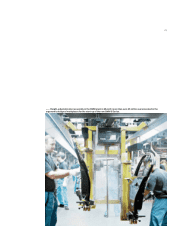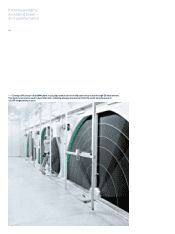BMW 2005 Annual Report Download - page 164
Download and view the complete annual report
Please find page 164 of the 2005 BMW annual report below. You can navigate through the pages in the report by either clicking on the pages listed below, or by using the keyword search tool below to find specific information within the annual report.16
Working on drive concepts for the future.
Nowadays, whenever people discuss climate change, emissions protection and finite re-
sources, they also talk about sacrifice, compromise and the need to use less. The develop-
ment engineers of the BMW Group are working on highly progressive drive technologies
with economical fuel consumption and low emissions. Amazingly, at the same time each
new generation of vehicle offers enhanced performance and dynamics. This is because the
BMW Group’s development engineers are following a concept called “EfficientDynamics”
which combines Sheer Driving Pleasure with more efficient energy utilisation.
Today, all new BMW petrol engines, with the exception of the M power units and special
engines, feature VALVETRONIC. This controls the valve opening times, timing and height,
and thus the flow rate, as a function of the accelerator pedal position. Thus, the valves
always work efficiently. This significantly increases the efficiency of the petrol engines.
Intelligent lightweight engineering concepts, such as are used, for example, in the current
BMW 5 and 6 Series, make the vehicles far lighter and thus reduce their energy consumption.
All these are seemingly small optimisation measures, but considered together in the entire
fleet of vehicles they represent a significant increase in efficiency: since 1990, the BMW
Group’s fleet consumption has decreased by almost 30 percent. In future, innovative drive
concepts are expected to bring further reductions. Newly developed High Precision
Injection, the BMW version of direct petrol injection with spray-guided lean combustion,
for example, is suitable for lowering petrol consumption by a further five to fifteen percent
in future. The BMW Group’s concept vehicle BMW Concept X3 EfficientDynamics, for
example, unites the currently most advanced combination of a highly efficient internal
combustion engine with the power of a high-performance electric motor. The key to the
BMW Concept X3 EfficientDynamics hybrid concept lies in the “super caps” in the side-
sills. Electric power is stored very quickly in these capacitors and can be called up when-
ever the driving dynamics requires it.
In the long term, however, the BMW Group aims to replace fossil fuels by regeneratively
produced hydrogen. In 2004, the Company convincingly demonstrated the efficiency of
this environment-friendly fuel with its H2R Research Car. The prototype with a twelve-
cylinder hydrogen combustion engine achieved a top speed of more than 300 km/h and
holds nine international records for hydrogen-powered vehicles with combustion engine.
The first BMW 7 Series automobiles with hydrogen combustion engine are currently in
the process of series development and will prove their suitability in daily use. Then the first
hydrogen-powered BMW automobiles that emit practically only steam upon combustion
will be on the road.Thus, today’s and tomorrow’s drivers will continue to experience Sheer
Driving Pleasure without compromise.
Knowing strengths,
developing power –
driving performance.
























